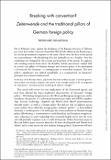Files in this item
Breaking with convention? : Zeitenwende and the traditional pillars of German foreign policy
Item metadata
| dc.contributor.author | Blumenau, Bernhard | |
| dc.date.accessioned | 2022-10-10T16:30:02Z | |
| dc.date.available | 2022-10-10T16:30:02Z | |
| dc.date.issued | 2022-11-01 | |
| dc.identifier | 281472224 | |
| dc.identifier | 43d9d4f4-dc5c-4615-9da2-5d3f4df2b42f | |
| dc.identifier | 85144773847 | |
| dc.identifier.citation | Blumenau , B 2022 , ' Breaking with convention? Zeitenwende and the traditional pillars of German foreign policy ' , International Affairs , vol. 98 , no. 6 , iiac166 , pp. 1895–1913 . https://doi.org/10.1093/ia/iiac166 | en |
| dc.identifier.issn | 0020-5850 | |
| dc.identifier.other | ORCID: /0000-0003-1072-3512/work/120849839 | |
| dc.identifier.uri | https://hdl.handle.net/10023/26169 | |
| dc.description.abstract | On 27 February 2022, German Chancellor Olaf Scholz addressed the Bundestag and announced a watershed moment (Zeitenwende) for Germany's conduct of foreign affairs. Against the backdrop of the historical pillars of German foreign policy, this article reviews the core implications of the Zeitenwende doctrine. It analyses how the new policy continued or transformed traditional notions underpinning Germany's external relations: Westbindung (integration into the West) and European integration, multilateralism, the pursuit of a rules-based international order and NATO membership, hesitant leadership, Ostpolitik and Wandel durch Handel (transformation through trade), as well as a foreign policy not relying on military means. It argues that Zeitenwende represented a break with some traditional notions, such as Ostpolitik and Wandel durch Handel, and to some extent the non-military foreign policy. However, Zeitenwende also reconfirmed other traditions: Westbindung, a commitment to multilateralism and the rule-based order, as well as the reluctance to assert German leadership. With Zeitenwende, Germany remained firmly committed to the EU and NATO as the country acknowledged that it must do more for its own, and for Europe's, security. Zeitenwende represented Germany's coming to terms with, and final acceptance of, the realities of the post-Cold War European order. | |
| dc.format.extent | 19 | |
| dc.format.extent | 186912 | |
| dc.language.iso | eng | |
| dc.relation.ispartof | International Affairs | en |
| dc.subject | JZ International relations | en |
| dc.subject | T-NDAS | en |
| dc.subject | MCC | en |
| dc.subject.lcc | JZ | en |
| dc.title | Breaking with convention? : Zeitenwende and the traditional pillars of German foreign policy | en |
| dc.type | Journal article | en |
| dc.contributor.institution | University of St Andrews. The Handa Centre for the Study of Terrorism and Political Violence | en |
| dc.contributor.institution | University of St Andrews. School of International Relations | en |
| dc.identifier.doi | https://doi.org/10.1093/ia/iiac166 | |
| dc.description.status | Peer reviewed | en |
This item appears in the following Collection(s)
Items in the St Andrews Research Repository are protected by copyright, with all rights reserved, unless otherwise indicated.

